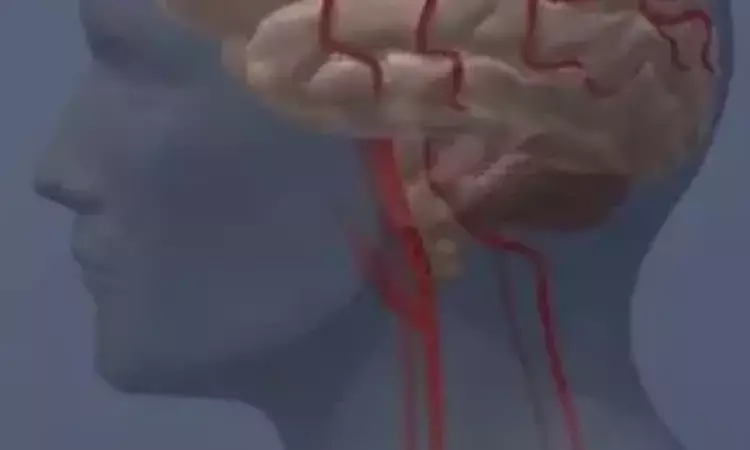- Home
- Medical news & Guidelines
- Anesthesiology
- Cardiology and CTVS
- Critical Care
- Dentistry
- Dermatology
- Diabetes and Endocrinology
- ENT
- Gastroenterology
- Medicine
- Nephrology
- Neurology
- Obstretics-Gynaecology
- Oncology
- Ophthalmology
- Orthopaedics
- Pediatrics-Neonatology
- Psychiatry
- Pulmonology
- Radiology
- Surgery
- Urology
- Laboratory Medicine
- Diet
- Nursing
- Paramedical
- Physiotherapy
- Health news
- Fact Check
- Bone Health Fact Check
- Brain Health Fact Check
- Cancer Related Fact Check
- Child Care Fact Check
- Dental and oral health fact check
- Diabetes and metabolic health fact check
- Diet and Nutrition Fact Check
- Eye and ENT Care Fact Check
- Fitness fact check
- Gut health fact check
- Heart health fact check
- Kidney health fact check
- Medical education fact check
- Men's health fact check
- Respiratory fact check
- Skin and hair care fact check
- Vaccine and Immunization fact check
- Women's health fact check
- AYUSH
- State News
- Andaman and Nicobar Islands
- Andhra Pradesh
- Arunachal Pradesh
- Assam
- Bihar
- Chandigarh
- Chattisgarh
- Dadra and Nagar Haveli
- Daman and Diu
- Delhi
- Goa
- Gujarat
- Haryana
- Himachal Pradesh
- Jammu & Kashmir
- Jharkhand
- Karnataka
- Kerala
- Ladakh
- Lakshadweep
- Madhya Pradesh
- Maharashtra
- Manipur
- Meghalaya
- Mizoram
- Nagaland
- Odisha
- Puducherry
- Punjab
- Rajasthan
- Sikkim
- Tamil Nadu
- Telangana
- Tripura
- Uttar Pradesh
- Uttrakhand
- West Bengal
- Medical Education
- Industry
Valbenazine benefits patients with Huntington's disease-associated chorea

A new drug has proven beneficial in treating a movement disorder commonly associated with Huntington's disease, according to a recent international study led by UTHealth Houston researcher Erin Furr Stimming, MD, who served as principal investigator on behalf of the KINECT-HD Huntington Study Group.
Furr Stimming, professor of neurology with McGovern Medical School at UTHealth Houston, presented findings from the Phase III, randomized, double-blind, placebo-controlled KINECT-HD study for the first time last week at the American Academy of Neurology 2022 Annual Meeting in Seattle, Washington.
She reported that valbenazine, a selective vesicular monamine transporter 2 (VMAT2) inhibitor that is not yet approved by the U.S. Food and Drug Administration specifically for Huntington's disease, was safe and effective when given as a once-daily treatment for chorea in patients with Huntington's disease. Chorea is an involuntary, irregular movement, and the cardinal motor feature in Huntington's disease.
"We are thrilled this study yielded positive results. We saw a statistically significant decrease in Huntington's disease-related chorea in patients taking valbenazine versus the placebo," said Furr Stimming, who is also director of the Huntington's Disease Society of America Center of Excellence at UTHealth Houston Neurosciences. "While chorea is not the only symptom our Huntington's disease patients experience, it can be quite problematic and can contribute to impairment in day-to-day activities like eating and drinking, and can even lead to frequent falls."
Interestingly, a majority of people with chorea do not receive a medication intended for the symptom, according to a separate abstract also presented by Furr-Stimming, which retrospectively analyzed data from the Enroll-HD dataset, a worldwide observational study that includes more than 20,000 participants in four continents. Chorea was documented in nearly 97% of participants; however, only 36% of these participants were prescribed medications for chorea, despite the availability of FDA-approved medications, such as VMAT2 inhibitors and off-label medications like antipsychotics and benzodiazepines.
Furr Stimming said continued research is needed to better understand optimal treatment patterns for chorea in patients with Huntington's disease.
"We do not yet have a disease-modifying therapy for Huntington's disease, and therefore, we must continue to focus on optimizing symptomatic treatments for the motor and nonmotor symptoms of this disease," she said.
Huntington's disease is a rare, inherited disease that typically begins in a person's 30s or 40s, causing nerve cells in the brain to break down over time. About 40,000 Americans have the fatal disease, while another 200,000 are at risk for inheriting the disease. No cure exists, but medications and physical, speech, and occupational therapy can help manage symptoms.
Dr Kamal Kant Kohli-MBBS, DTCD- a chest specialist with more than 30 years of practice and a flair for writing clinical articles, Dr Kamal Kant Kohli joined Medical Dialogues as a Chief Editor of Medical News. Besides writing articles, as an editor, he proofreads and verifies all the medical content published on Medical Dialogues including those coming from journals, studies,medical conferences,guidelines etc. Email: drkohli@medicaldialogues.in. Contact no. 011-43720751


